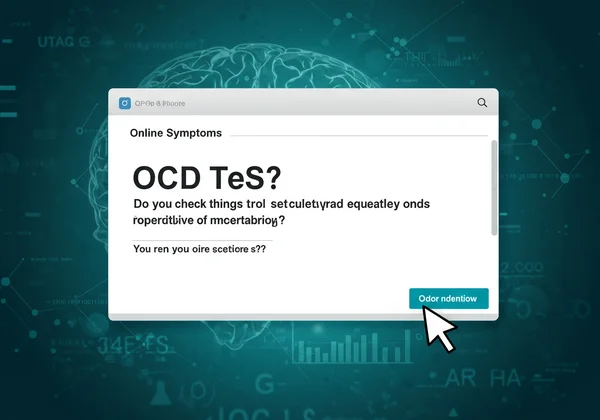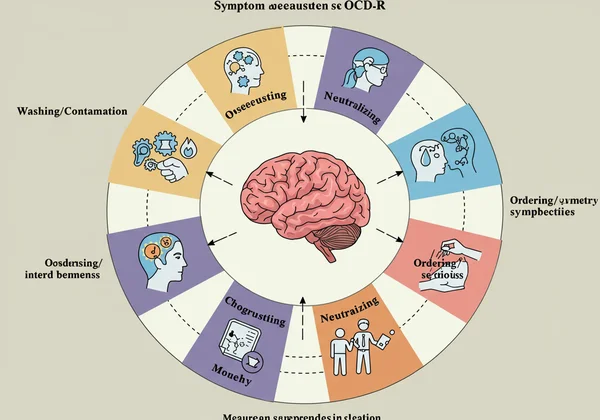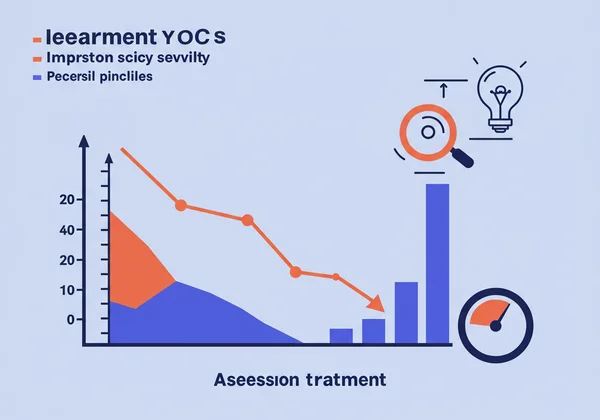Ciência do Teste de TOC: Escalas OCI e YBOCS Explicadas
September 15, 2025 | By Samuel Griffin
Navegar pelo mundo dos recursos online de saúde mental pode ser avassalador. Quando você busca clareza, a última coisa de que precisa é mais confusão. Você pode estar se perguntando: "Quão confiáveis são esses testes de TOC online?" É uma pergunta válida. A internet está repleta de questionários, mas um teste de TOC credível se destaca por ser construído sobre uma base científica sólida. Este artigo desmistificará os poderosos princípios psicológicos por trás das ferramentas confiáveis de rastreio de TOC, explorando as escalas estabelecidas como OCI e YBOCS que fundamentam sua robustez. Compreender essa ciência é o primeiro passo em sua jornada de autoconsciência.

Quando estiver pronto para ver como esses princípios funcionam na prática, você pode fazer nosso Teste de TOC gratuito e confidencial e obter informações valiosas. Esta ferramenta oferece um ponto de partida seguro e informativo, ajudando você a entender melhor suas experiências através de uma lente cientificamente fundamentada.
Por Que as Escalas Científicas de Avaliação de TOC São Essenciais
Nem todos os testes online são criados iguais. Um questionário que faz algumas perguntas genéricas é fundamentalmente diferente de uma ferramenta de rastreio baseada em décadas de pesquisa psicológica. O uso de escalas padronizadas é o que separa o entretenimento da autoavaliação genuína. Essas ferramentas fornecem uma maneira estruturada e consistente de medir experiências, o que é vital para obter insights significativos.
Quando você usa uma ferramenta baseada em escalas de avaliação de TOC estabelecidas, você está se envolvendo com uma estrutura que foi testada e refinada por profissionais de saúde mental. Isso garante que as perguntas que você responde são relevantes, direcionadas e projetadas para explorar as dimensões específicas do Transtorno Obsessivo-Compulsivo. O objetivo é transitar da incerteza vaga para informações claras e acionáveis.
A Importância das Ferramentas Padronizadas no Rastreio da Saúde Mental
Imagine construir uma casa sem uma régua. Você poderia estimar as medidas, mas os resultados seriam não confiáveis e inconsistentes. As ferramentas padronizadas no rastreio da saúde mental agem como essa régua confiável. Elas garantem que todos sejam medidos pelos mesmos critérios, permitindo resultados mais objetivos e comparáveis. Essa padronização é crucial por algumas razões principais:
- Confiabilidade: Uma ferramenta confiável produz resultados consistentes ao longo do tempo.
- Validade: Uma ferramenta válida mede com precisão o que ela afirma medir – neste caso, sintomas relacionados ao TOC.
- Objetividade: Reduz o viés pessoal, focando em critérios específicos e observáveis, em vez de apenas sentimentos subjetivos.
O Que Confere Credibilidade a um Teste de TOC Online?
Um teste de TOC online credível é transparente sobre sua base. Ele não promete um diagnóstico, mas oferece um rastreio estruturado baseado em princípios cientificamente validados. Procure por ferramentas, como a nossa, que referenciam as estruturas desenvolvidas por especialistas. Esse suporte científico é o que permite que um teste de TOC preciso sirva como um primeiro passo confiável. Ele o capacita com insights baseados em dados que você pode usar para autorreflexão ou para iniciar uma conversa com um profissional de saúde.

Compreendendo o OCI-R: O Inventário Obsessivo-Compulsivo
Uma das ferramentas mais respeitadas e amplamente utilizadas tanto na pesquisa quanto na prática clínica é o Inventário Obsessivo-Compulsivo Revisado (OCI-R). Esta não é apenas uma lista aleatória de perguntas; é um instrumento cuidadosamente projetado que ajuda os indivíduos a relatarem a natureza e a gravidade de seus sintomas de TOC. Sua força reside em sua capacidade de simplificar a complexa experiência do TOC em componentes mais gerenciáveis.
O OCI-R é um questionário de autorrelato, o que significa que foi projetado para você refletir sobre suas próprias experiências. Essa abordagem é empoderadora, pois centra sua perspectiva pessoal. Ele pede que você avalie o quanto pensamentos e comportamentos específicos lhe causaram angústia recentemente, fornecendo uma imagem nuanceada de seu estado mental.
O Que o OCI-R Mede e Como Funciona
Em sua essência, o OCI-R mede as principais categorias de sintomas associadas ao TOC. Em vez de tratar o TOC como uma condição única e monolítica, ele reconhece que se manifesta de diferentes maneiras para pessoas diferentes. O inventário inclui subescalas que avaliam várias dimensões de sintomas, fornecendo um perfil mais detalhado da experiência de um indivíduo.
O processo é simples. Você é apresentado a uma série de afirmações (por exemplo, "Verifico as coisas com mais frequência do que o necessário") e deve avaliá-las em uma escala, geralmente de "De jeito nenhum" a "Extremamente". A pontuação final indica a gravidade geral dos sintomas de TOC e destaca quais dimensões são mais proeminentes para você. Esta é uma parte fundamental de um teste de sintomas de TOC abrangente.
Identificando Dimensões Específicas dos Sintomas de TOC com o OCI-R
O verdadeiro poder do OCI-R é sua capacidade de identificar dimensões específicas dos sintomas de TOC. Isso ajuda você e os profissionais a entender o padrão único de seus sintomas. As principais dimensões tipicamente cobertas incluem:
- Lavagem/Contaminação: Medo de germes e rituais excessivos de limpeza.
- Obsessão/Ruminação: Pensamentos indesejados, intrusivos e angustiantes.
- Acumulação: Dificuldade em descartar itens, levando à desordem.
- Organização/Simetria: Uma necessidade de que as coisas estejam perfeitamente arranjadas ou "perfeitas".
- Verificação: Verificar repetidamente fechaduras, aparelhos ou erros.
- Neutralização: Usar rituais mentais para cancelar pensamentos "ruins".
Ao entender quais dimensões estão mais ativas, você obtém uma imagem mais clara do que está enfrentando. Se você está curioso sobre seus próprios padrões de sintomas potenciais, pode explorar nosso teste de rastreio de TOC.

Explorando a Escala YBOCS: Medindo a Gravidade dos Sintomas de TOC
Embora o OCI-R seja excelente para identificar os tipos de sintomas de TOC, a Escala Obsessivo-Compulsiva de Yale-Brown (YBOCS) é considerada o padrão de referência para medir sua gravidade. Desenvolvida na Universidade de Yale, esta escala é tipicamente administrada por um clínico para avaliar o impacto do TOC na vida de uma pessoa. Embora nossa ferramenta online seja um rastreio preliminar e não uma administração clínica do YBOCS, seus princípios informam fortemente nosso design.
O YBOCS foca no "quanto" em vez de apenas no "o quê". Ele avalia fatores como quanto tempo você gasta em obsessões e compulsões, o quanto elas interferem em sua vida diária e o nível de angústia que causam. Esse foco na avaliação da gravidade dos sintomas de TOC proporciona uma compreensão crítica do impacto da condição.
A Importância da Escala Obsessivo-Compulsiva de Yale-Brown no Diagnóstico
Em um ambiente clínico, a importância da Escala Obsessivo-Compulsiva de Yale-Brown no diagnóstico e planejamento do tratamento é central. Um terapeuta usa uma entrevista semiestruturada para pontuar o YBOCS, fazendo perguntas detalhadas para entender as nuances da experiência da pessoa. Ele ajuda os clínicos a:
- Estabelecer uma linha de base para a gravidade dos sintomas antes de iniciar o tratamento.
- Acompanhar o progresso ao longo do tempo para ver se terapias como TCC ou ERP estão funcionando.
- Medir objetivamente o impacto geral do TOC no funcionamento.
Essa abordagem rigorosa é o que confere ao YBOCS tanta confiança na comunidade profissional de saúde mental.
Como os Princípios do YBOCS Informam Nosso Rastreio Inicial para TOC
Uma autoavaliação online não pode replicar uma entrevista clínica do YBOCS. No entanto, os princípios centrais do YBOCS informam nosso rastreio inicial para TOC, inspirando perguntas que vão além da mera presença de um sintoma. Nosso teste é projetado para explorar conceitos centrais ao YBOCS, como:
- A frequência e duração dos pensamentos obsessivos.
- O nível de angústia causado por esses pensamentos.
- A extensão em que as compulsões interferem na vida social ou profissional.
Ao incorporar esses princípios, fornecemos uma experiência de rastreio mais perspicaz e clinicamente relevante. Isso ajuda a garantir que os resultados que você recebe ofereçam um reflexo significativo de seus desafios, capacitando você a iniciar sua autoavaliação com confiança.

O Papel dos Princípios Científicos na Sua Jornada de Teste de TOC
Sua jornada para entender sua saúde mental merece começar em uma base sólida. Confiar em princípios científicos em sua jornada de teste de TOC garante que o primeiro passo que você dá seja significativo e confiável. Trata-se de escolher um caminho de clareza, apoiado por evidências e expertise, em vez de um de suposições e incertezas.
Uma ferramenta cientificamente fundamentada fornece uma ponte, conectando suas experiências pessoais e privadas a um arcabouço de compreensão mais amplo e objetivo. Isso pode ser incrivelmente validante, ajudando você a perceber que não está sozinho e que existe uma linguagem estruturada para descrever o que você está passando. Transforma sentimentos de isolamento em um senso de empoderamento.
Fazendo a Ponte: Da Autoavaliação aos Insights Profissionais
O objetivo final de uma ferramenta de rastreio é fazer a ponte entre a autoavaliação e os insights profissionais. Um teste online confidencial serve como uma etapa preliminar de coleta de dados. Ele organiza suas experiências em um resumo claro sobre o qual você pode refletir ou, se desejar, compartilhar com um médico ou terapeuta.
Este passo inicial pode fazer com que a busca por ajuda profissional pareça menos intimidante. Em vez de começar do zero, você chega com uma compreensão fundamental de seus sintomas potenciais. Isso permite uma conversa mais focada e produtiva sobre os próximos passos. Depois de obter seus resultados confidenciais, você estará mais bem equipado para essa conversa.
Por Que Confiança e Transparência São Essenciais em Ferramentas de Saúde Mental Online
Na área sensível da saúde mental, confiança e transparência são essenciais. Uma ferramenta confiável é sempre clara sobre o que é e o que não é. Nossa plataforma é explícita de que nosso teste é uma ferramenta de rastreio, não um instrumento de diagnóstico. Somos transparentes sobre os princípios científicos (OCI e YBOCS) que guiam nossas perguntas.
Este compromisso com a honestidade constrói um ambiente seguro para você explorar seus sintomas livre de desinformação. Acreditamos que capacitá-lo com conhecimento sobre a ciência por trás de nossa ferramenta é a maneira mais ética e eficaz de apoiar sua jornada de saúde mental.
Capacitando Sua Jornada com Ciência: Confiando nos Resultados do Seu Teste de TOC
Compreender a ciência por trás das escalas OCI e YBOCS torna mais claro o processo de um teste de TOC online. Não se trata de perguntas arbitrárias, mas de uma abordagem estruturada e baseada em evidências para explorar seus sintomas. Essa base científica garante que, ao receber seus resultados, você possa confiar neles como um ponto de partida valioso e confiável para o autoconhecimento.
Fazer um teste de TOC bem projetado é um passo proativo e corajoso. É um ato de autocuidado que pode fornecer a clareza necessária para seguir em frente. Armado com esse conhecimento, você está mais bem preparado para tomar decisões informadas sobre seu bem-estar mental.
Pronto para dar o próximo passo com uma ferramenta em que você pode confiar? Comece seu teste de TOC gratuito agora e obtenha uma compreensão mais profunda, com suporte de IA, de suas experiências únicas.
Perguntas Frequentes Sobre as Escalas de Teste de TOC
Como sei se um teste de TOC online é confiável?
Um teste de TOC confiável será transparente sobre sua base científica. Procure por menções a escalas psicológicas estabelecidas como o OCI-R (Obsessive-Compulsive Inventory-Revised) ou princípios do YBOCS (Yale-Brown Obsessive Compulsive Scale). Testes credíveis focam no rastreio de sintomas e sempre afirmam que não são um substituto para um diagnóstico profissional.
Qual a principal distinção entre o OCI e o YBOCS?
A principal distinção reside em seu propósito e formato primários. O OCI-R é um questionário de autorrelato projetado para identificar a presença e o tipo de sintomas de TOC em várias dimensões (como verificação, organização, etc.). O YBOCS é uma entrevista administrada por um clínico considerada o padrão de referência para medir a gravidade e o impacto desses sintomas na vida de uma pessoa.
Um teste de TOC online pode, de fato, substituir um diagnóstico profissional?
Não, um teste online não pode e não deve substituir um diagnóstico profissional. Um diagnóstico formal só pode ser feito por um profissional de saúde qualificado (como um psiquiatra ou psicólogo) após uma avaliação abrangente. Um teste de TOC online é uma valiosa ferramenta de rastreio preliminar que ajuda você a entender seus sintomas e pode servir como um ótimo ponto de partida para uma conversa com um especialista.
É TOC ou ansiedade? Como essas escalas auxiliam na diferenciação?
Esta é uma pergunta comum e importante. Embora o TOC seja um transtorno de ansiedade, sua característica principal é a presença de obsessões e/ou compulsões. Escalas como o OCI-R são especificamente projetadas para medir esses componentes centrais do TOC. Uma escala geral de ansiedade não focaria nesses temas específicos. Portanto, um teste baseado em escalas específicas de TOC pode ajudar a indicar se seus sintomas se alinham mais de perto com os padrões típicos de TOC versus ansiedade generalizada.